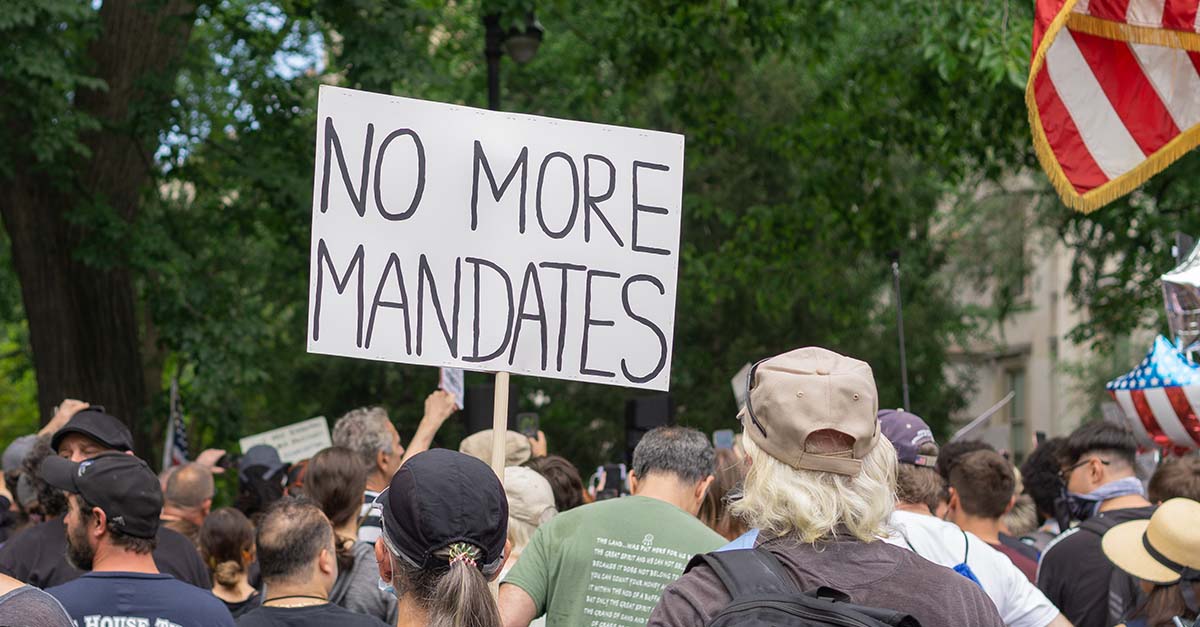


Get a free copy of Parental Rights & Education when you subscribe to our newsletter!

“To the state, the freedom of conscience represents a limit to the nature and extent of its power; because of freedom of religion and conscience, it must act on citizens’ consciences “by reason and conviction, not by force or violence.”
Jason Ross
No text is more celebrated as a guide to the genius of our nation’s founders than The Federalist Papers, and no single essay from The Federalist is more celebrated than James Madison’s No. 10. In it, Madison offers the promise of the “well-constructed union” that tends “to break and control the violence of faction.”
During the decades of peace and prosperity following World War II, we Americans may have convinced ourselves that we had solved the problem of faction once and for all. But as we revisit Federalist No. 10 at a time when the violence of faction is no longer under control, our attention may be drawn to the sobering consequences of Madison’s belief that “the latent causes of faction are sown in the nature of man.”
Some may have succumbed to the magical thinking that a value-free pluralism could neutralize those consequences. Our generation can now read Madison clearly: “So strong is this propensity of mankind to fall into mutual animosities, that where no substantial occasion presents itself, the most frivolous and fanciful distinctions have been sufficient to kindle their unfriendly passions and excite their most violent conflicts.” Humans will fight about everything and nothing, and our age sees this sorry truth confirmed on a daily basis.
Madison’s allusion to civil war was not empty rhetoric. In fact, the essays preceding Federalist No. 10 explored in great detail the danger of internecine conflicts to which free and self-governing peoples are prone. The earlier essays remind us that “men are ambitious, vindictive and rapacious.” More, we are reminded of the history of ancient republics that were in “perpetual vibration between the extremes of tyranny and anarchy.” In Madison’s telling, faction is a disease endemic to republican government. It cannot be cured. It cannot, like a cancer, be removed. Instead, it is a chronic condition that can only be managed.
Despite Madison’s warning to us about the dangers of faction that republican government presents us, he insisted that attempting to cure the dangers of faction by removing liberty would be “worse than the disease.” Yet nowhere in the Federalist essays do any of the authors explain why liberty is so valuable that it is worth hazarding the consequences of human nature. Madison begs this question but does not answer it.
One reason he may not have felt the need to answer this question is that it was regularly being answered in the pulpits of American churches. Congregationalist minister Jonathan Mayhew found scripture to be teaching that “wise, brave and virtuous men were always friends to liberty.” He preached that God had given the Israelites a king “because they had not sense and virtue enough to like a free commonwealth,” and he reminded his congregation that Jesus Christ had come to earth “to make us ‘free indeed.’”
Mayhew was a powerful influence on John Adams, who called for “the pulpit [to] resound with the doctrines and sentiments of religious liberty.” To Adams, the liberty of republican government represented the full realization of “the noble rank” we hold as children of God.
Presbyterian minister John Witherspoon, a signer of the Declaration of Independence, assured Americans in May 1776 that the American cause “is the cause of justice, of liberty, and of human nature.” But this cause was not merely their own. Instead, Witherspoon argued that full knowledge of God’s truth was only possible under the reign of religious and political liberty. He warned, “There is not a single instance in history in which civil liberty was lost, and religious liberty preserved entire.”
Witherspoon was president of the College of New Jersey (now Princeton) when James Madison was a student. There Madison learned of the irreducible unity of political and religious liberty, and of the foundation of liberty on the freedom of our conscience. To the individual, freedom of conscience represents an inalienable right, and it represents a duty to honor our Creator that precedes and transcends any claim that civil society might make. To the state, the freedom of conscience represents a limit to the nature and extent of its power; because of freedom of religion and conscience, it must act on citizens’ consciences “by reason and conviction, not by force or violence.”
In short, the religious frame of liberty was so widely known at our nation’s founding that Madison and his coauthors did not need to reference it in the Federalist. The same cannot be said today. It is no surprise that those who reject the belief that liberty originates from God and is given to us by Him also reject Madison’s reasoning against renouncing liberty to remove the causes of faction.
Liberty is always out of fashion to those in power. It has always been the historical exception rather than the rule. If the liberty and institutions of the American republic are to survive to the next generation, we will need to recapture our founding generation’s understanding of the irreducible political and religious meaning of liberty.
Jason Ross is associate professor and associate dean in the Helms School of Government at Liberty University. This essay, reprinted with permission, was originally published in “The Washington Times” and is one in the publication’s series examining the Constitution and the Federalist Papers in today’s America.
